Do you know what the Formula 1 driver, the groupie, and the WordPress site creator who wants to make it known to as many people as possible have in common?
All three want to be well positioned, of course! The driver wants to start on the front row of the grid to increase his chances of victory.
The groupie wants to be in the front row of the concert to see the star she’s a fan of.
And the web designer – you – is enviously eyeing the top spots in the search engine results.

But here’s the thing: being well ranked on Google and other search engines is a complex task when you start to develop your website’s SEO. You probably know what I mean.
To give yourself a chance to be visible, the use of an SEO plugin on your WordPress site remains a valuable asset
To help you choose the right one, we present you in detail 7 essential plugins on the subject (and for whom they are intended). Let’s get off to a great start.
Overview
Transparency point: This article contains affiliate links. This means that if you buy a product via one of these links, WPMarmite will get a commission. This allows us to pay for the research and writing work of the blog’s editors and to build up a fund to buy and test themes, plugins, etc. To learn more, take a look at our publishing policy.
Take a look at our detailed guide about choosing your domain name and the one for creating a professional WordPress website.
What is SEO?
SEO is the acronym for Search Engine Optimization which is different from paid referencing. “SEO targets unpaid traffic (known as “natural” or “organic” results) rather than direct traffic or paid traffic” as explained on Wikipedia.
By extension, SEO refers to all the actions you will undertake to try to rank your site (its posts and pages) as high as possible in the Search Engine Results Page (SERP) (Google, Bing, Yahoo etc.).
With one goal: to appear before the eyes of the Internet user when he enters a specific keyword (e.g. best seo plugins) on his favorite search engine so that he clicks on your content and lands on your site.
Search engine optimization, a strategy that can pay off
Traditionally, the traffic of a website can come from different sources:
- Social media.
- Email, via a newsletter for example.
- Paid advertising.
- Another website that links to yours.
- A web browser, when the user directly types in the URL of your WordPress site because he already knows you or has heard of you.
- A search engine.
This last case is very interesting. When a site is well ranked, the most important source of traffic is often from a search engine (although this is not an absolute rule).
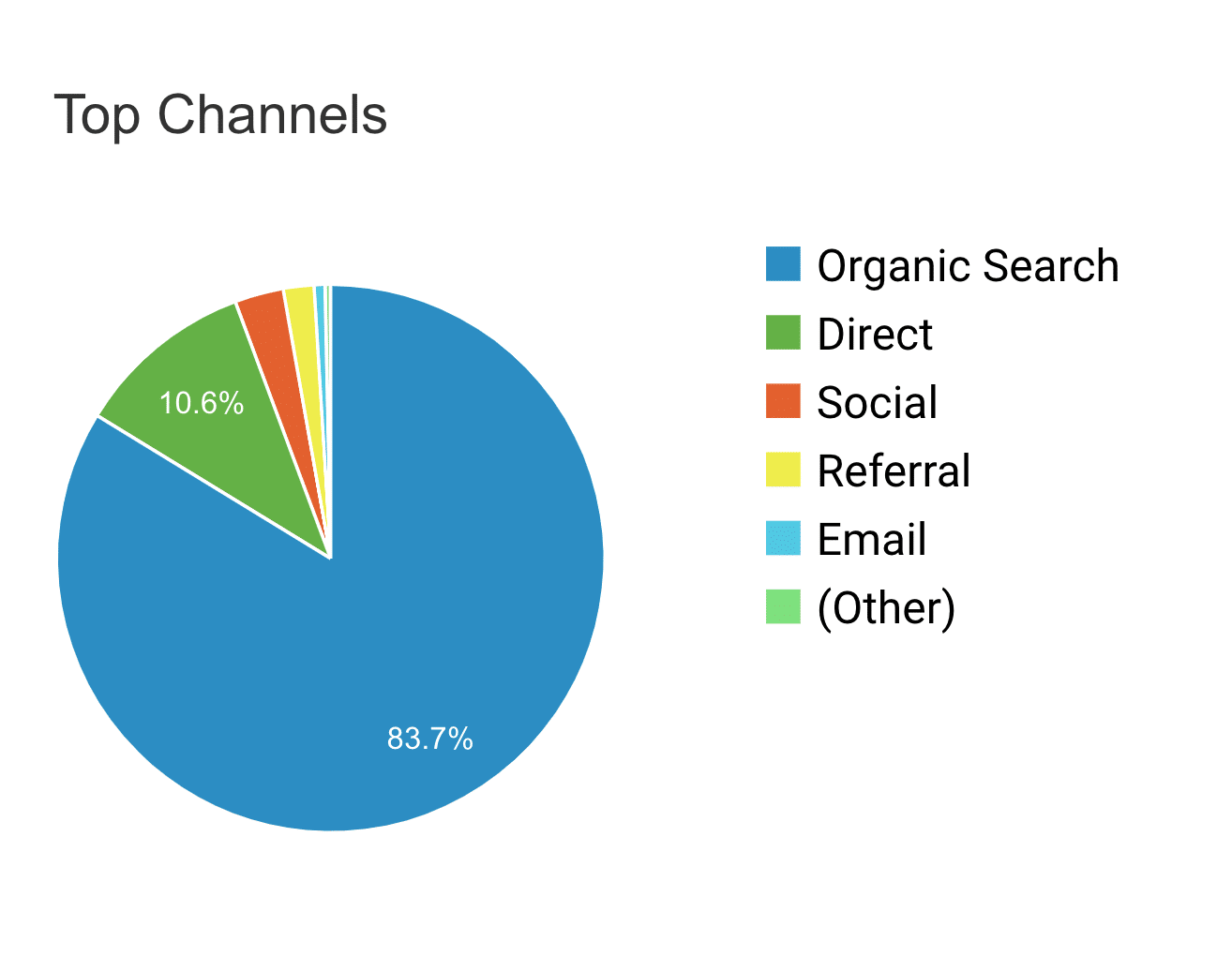
Moreover, organic traffic (from a search engine) has a very specific intention. The Internet user does not arrive on a site by chance. They are looking for information, want to buy a product, or want to find a site they already know.
By working on the SEO of your site, you increase your chances of being visible on search engines, and therefore your possibilities of increasing traffic to your WordPress site.
This can lead to several important benefits:
- You become more visible and can establish your expertise and reputation.
- You get a more targeted and qualified traffic, and less volatile than with traffic from paid advertising, for example.
- Your content remains visible over time: this ensures you a long-term traffic, unlike paid advertising. As soon as you stop paying to be visible on Google, you disappear from its search results.
- You offer Internet users what they are really looking for. The majority of them prefer to click on natural results rather than paid results.
- You can increase your revenue and sales.
If you want to bring your site out of anonymity and make it visible to as many people as possible, you don’t really have a choice: optimizing your SEO remains a determining factor.
Do WordPress and SEO work together?
For this, WordPress is naturally a very valuable ally. When it was first launched in 2003, it was designed as a blogging engine. Content is what it’s all about.
And content, search engines like Google love it. It’s what they use to index and rank content in their search results pages.
Good news, then: our great CMS (Content Management System) WordPress has a solid foundation for SEO!
When we talk about search engines throughout these lines, we will most often refer to Google, which is the overwhelming majority in the world, with more than 91% of the market share. It is primarily on it that you must concentrate your efforts.

Why use a WordPress SEO plugin on your site?
It’s not bad, but even if WordPress is naturally optimized for SEO, it won’t be enough to try to rank at the top of a search engine’s results.
To appear on Google, you need to take care of several fundamental aspects:
- The contents of your site. They must be relevant and meet a need and a search intention. To do this, you need to identify the keywords your target (your typical reader) is looking for.
- The backlinks. These are links that are made by other sites to yours.
- The technical elements of the site. The latter must be well coded to be easily browsed by search engines, ergonomic, responsive (adapted to mobile navigation), efficient, secure (use of HTTPS), etc.
Schematically, we can divide the actions to be taken into two parts to improve your ranking in search results:
- “This covers any tactics that you use that don’t involve making changes to your own website or publishing content on your own site” as explained by Semrush. This is called off-page SEO and refers in particular to the getting backlinks.
- Optimizing your site’s pages: on-page SEO.
When it comes to on-page SEO, WordPress has several limitations. For example, it does not allow you to:
- Fill in the Title and meta description tags, which are very important in SEO.
- Create a sitemap or a
robots.txtfile. - Design a breadcrumb trail.
- Set up redirects, etc.
To learn all about on-page SEO on WordPress and optimize your site, check out our complete guide.
To overcome these problems, there are two solutions: get your hands in the code, or use a SEO plugin.
The latter solution is simpler and faster for the beginner, which is why we will focus on it in detail in this article.
With a WordPress SEO plugin, it’s all about pole position?
However, the use of an SEO plugin will not be the miracle solution that will automatically get you to the top position on Google: sorry if I’m hurting your enthusiasm.
On the other hand, a plugin will facilitate the work of search engines that will come to browse your site. If you do things correctly, you’ll make sure you don’t get in their way, and you’ll have every chance of ranking well.
Provided, in parallel, that you have backlinks, a healthy site architecture, and publish excellent content. I’m repeating myself, but it’s important to understand all these points.
Alright, now, let’s discover 7 must-have WordPress SEO plugins.

7 WordPress SEO plugins put to the test
Before going into the details of the selected plugins, a clarification: we have chosen to present you only general SEO plugins (ranked according to the number of active installations).
That is to say, plugins that allow you to perform several types of optimization at once, and not just one specific action (like Redirection, which focuses primarily on creating… redirects).
So we’ve selected plugins – all with at least one free version – that offer features that we think are essential to optimize your on-page SEO (even if, depending on your needs, you won’t use them all, of course), such as:
- Customization of your meta tags (title and meta description).
- Creating an XML sitemap.
- Adding structured data (Schema.org).
- Designing Breadcrumbs.
- URL optimization.
- Open Graph data generation.
- Content analysis.
Is this all good for you? It’s time to discover the first selected plugin.
Yoast SEO, the undeniable heavyweight

Active installations: 5M+
You know this one for sure. With more than 5 million active installations, it is the heavyweight of this selection, and it is probably the most famous SEO plugin on WordPress.
Launched in 2010 by Joost de Valk (hence the name Yoast), Yoast SEO is part of the very closed circle of the 10 most popular plugins on the official directory (those with at least 5 million active installations).
If Yoast has managed to make a place for itself in the sun, it’s because this plugin is relatively simple to learn, easy to use and has many features.
As stated on its official website, “Yoast SEO makes sure your site meets the highest technical SEO standards. It also gives you the tools to optimize your content for SEO and overall readability”.
With Yoast, we particularly appreciate
- The Swiss army knife aspect of the plugin: it allows you to perform all the basic optimizations, and this with its free version: meta title tags, XML sitemap, breadcrumb integration, etc.
- Its colorful and intuitive interface, which makes it easy for the user to learn. You can simply activate/deactivate options with a simple click.
- Its ultra-complete meta box (insert) that is displayed when you edit a page or a post. Through an SEO and readability analysis, you will discover suggestions to improve the structure and style of your text.
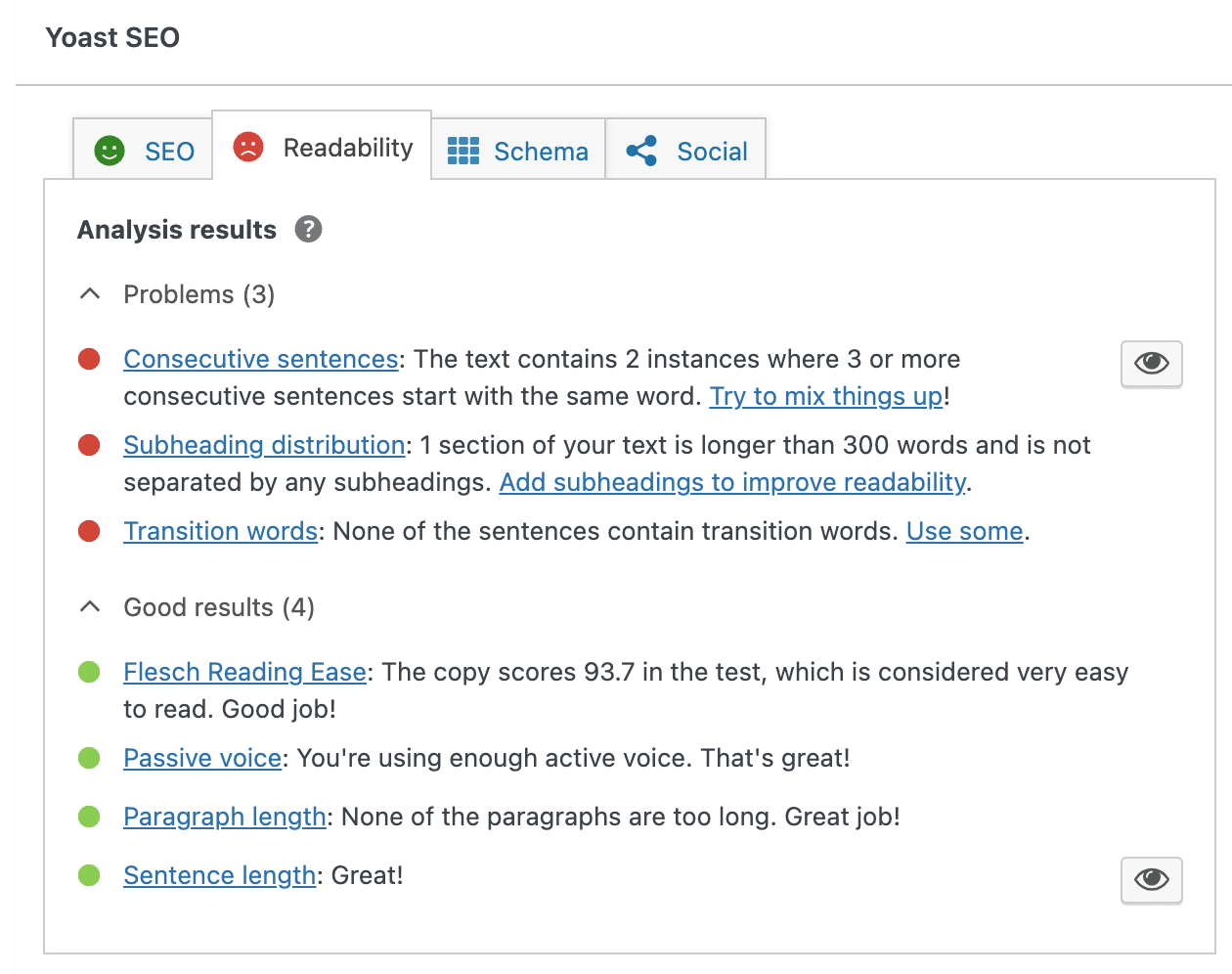
- The possibility to easily link the plugin to Google Search Console.
- Options to optimize your site for the main social media.
- Editor to customize your robots.txt and .htaccess files.
- Schema.org data support to help Google identify and understand your site and its content.
- Sustained frequency of updates. Yoast is updated very often (once or twice a month on average), to adapt to frequent changes in the Google algorithm and continue to improve. A solid and numerous team is working behind it, which is very reassuring for the user.
The free version of Yoast SEO is more than enough if you are just starting out and/or want to do some basic tweaking.
However, Yoast has a premium version at $99/year (email support and updates included) which offers an automatic redirection manager and a tool to strengthen your internal links.
Beyond that, Yoast also offers 4 paid plugins, each sold for $79/year, for very specific uses: Video SEO, Local SEO, News SEO and Yoast WooCommerce SEO.
Yoast SEO, for whom?
Yoast is intended for all types of public but will be particularly suitable for beginners, who will be seduced by its ease of use.
Made famous for its traffic lights, you will have to beware of them when optimizing your content! If they give interesting insights, they don’t have to be strictly followed.
A content that does not contain 100% traffic lights will not have less chances to rank well than a content full of green lights.
Want to go further with Yoast SEO? Check out our detailed tutorial to configure it menu by menu. As a bonus, we even offer you an exclusive PDF file!
Download Yoast SEO:
All in One SEO, the historical (still) well anchored

Active installations: 3M+
All in One SEO (AIOSEO) is the “old-timer” of this comparison, and is among the pioneer plugins for SEO on WordPress.
It was born in 2007, which explains in part its number of active installations (over 3 million). Solid and well established, it has also gained popularity because it is efficient and promises to simplify the SEO of your WordPress site “in less than 10 minutes”.
Launched by Michael Torbert, All in One SEO was acquired in 2020 by Awesome Motive, the company owned by Syed Balkhi, who can be found behind the WP Beginner blog, OptinMonster, MonsterInsights, SeedProd, WPForms, etc.
Since then, Awesome Motive has changed the plugin, especially in terms of its interface, more intuitive and more colorful.
With All in One SEO, we appreciate
- Its configuration wizard that takes you by the hand as soon as you activate the plugin. In 6 clear and visual steps, you can set the title and meta description of your homepage, your social media profiles, or your sitemaps.
- The explanatory video to help you set up the plugin when you discover it for the first time.
- The interface, ergonomic and pleasant.
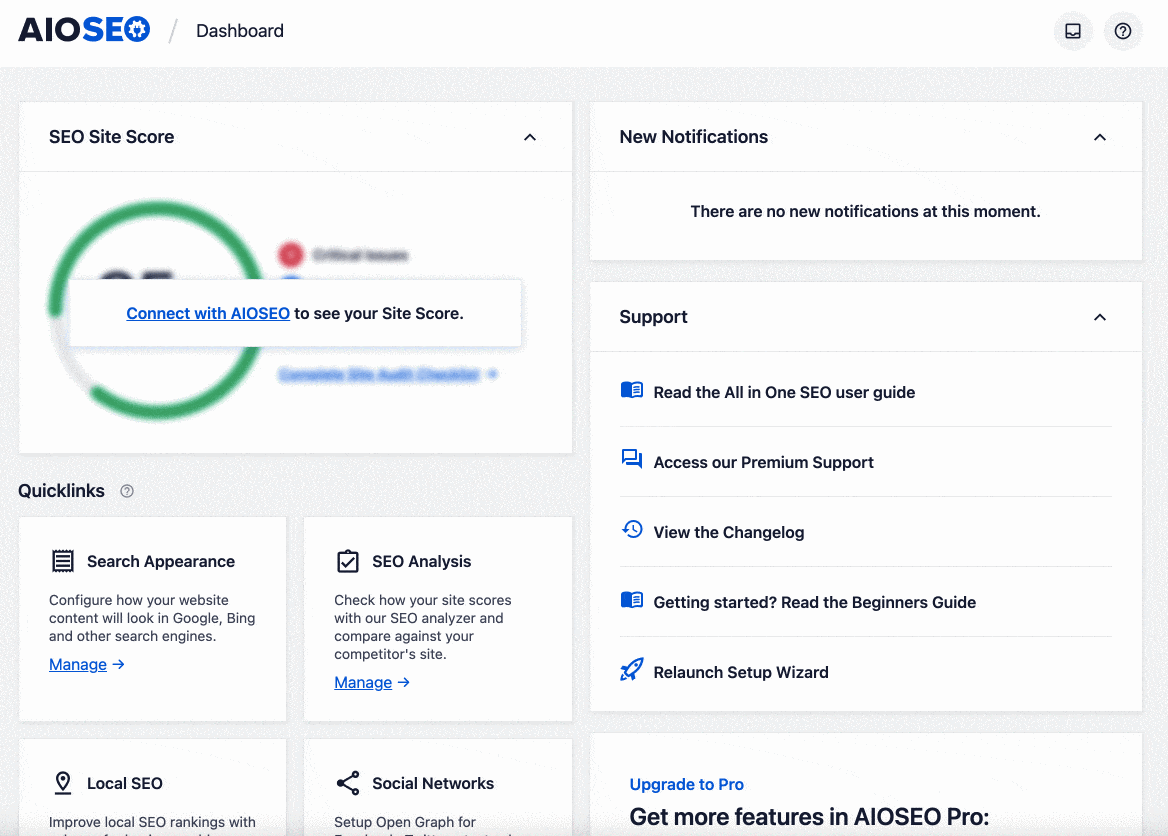
The classic functionalities that one would expect are present in the free version: customization of metadata for your pages, categories and tags, Knowledge Graph, connection to the Google Search Console, activation of a breadcrumb trail, social media settings, activation of a sitemap, editing of robots.txt and .htaccess files.
The page analysis tool, which provides suggestions on how to optimize the content of your content, especially in terms of readability, as offered by Yoast SEO.
AIOSEO also has a Premium version, sold from $49.60 for 1 site. But to benefit from all the options offered, you must at least start on the Pro license ($199.60/year), which represents a significant investment.
It provides access to modules to optimize the SEO of your images, local SEO, a video sitemap, a redirect manager, 404 error tracking, etc.
All in One SEO, for whom?
All in One SEO is a plugin that is clearly intended for beginners, at least in its free version.
Many efforts have been made to provide an optimal user experience and simplify the life of the webmaster: it works.
To find out more about All in One SEO, read our dedicated article.
Download All in One SEO Pack:
Rank Math, the greedy challenger

Active installations: 2M+
“The Swiss army knife of WordPress SEO”. That’s how this plugin presents itself on its website’s home page.
Rank Math is quite a challenger that keeps swallowing market share, to the point of accumulating over 2 million active installations at the time of writing.
For a plugin launched in 2018, that’s really not bad. Part of the reason Rank Math has managed to carve out a nice slice of the pie is because it’s packed with free features you won’t see anywhere else.
And by the way, its users give it an excellent rating of (out of nearly 5,000 reviews submitted at the time of writing).
With Rank Math, we particularly appreciate
- The quick and easy basic installation, guided step by step by a powerful configuration wizard.
- The fact that the tool is both fun and easy to use. Modules allow you to activate only the options you need.
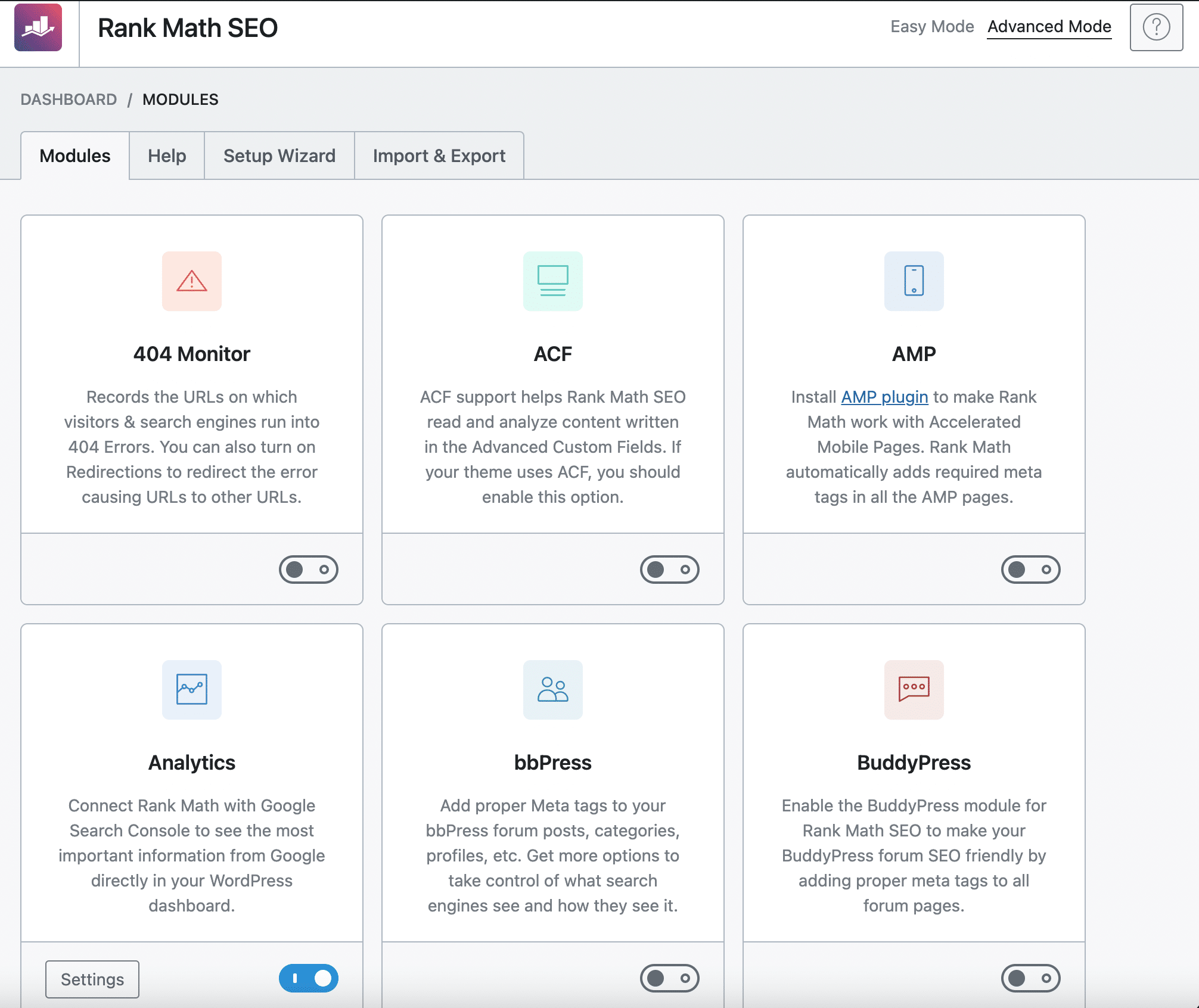
- The user interface is very clear and ergonomic.
- Options galore, and free on top of that. Everything you find in Yoast is present in Rank Math, and you can go even further.
- Rank Math allows you to optimize your content for an unlimited number of keywords (and get suggestions), track your keyword rankings in Google, and even perform SEO redirects, tests and audits!
- SEO support for your images, with the possibility to automatically add alt or title tags to images that don’t have them.
- Advanced integration with two famous page builders: Elementor and the Divi Builder. This allows you to configure your on-page SEO directly from the interface of each page builder, without having to go back to the WordPress dashboard each time (Yoast allows it too, by the way).
- The use of artificial intelligence to help you improve your content, and better satisfy search engines, using the “Content AI” feature. You’ll get suggestions for related searches, keywords, links or media to integrate, questions to address etc. Check it out, it’s very interesting and innovative
For the rest, Rank Math is also available in a premium version (from $49/year for a use on an unlimited number of sites). This version is intended for advanced users.
In short, it allows for much more advanced monitoring and analysis (tracking of your keywords, performance reports, advanced redirection module, detection of orphaned pages, etc.).
Rank Math, for whom?
The multitude of options and settings that Rank Math offers can be a hindrance for the beginner user. Although the plugin is very powerful, it is important to keep in mind that a longer learning curve than with Yoast will be necessary to take full advantage of it.
Rank Math can therefore be suitable for a beginner, but it seems more appropriate for a user who has a minimum of SEO basics.
Want to know more about Rank Math? Set out to conquer this must-have SEO plugin by exploring the test we devoted to it.
Download Rank Math:
SEOPress, the French rooster

Active installations: 300K
After the Dutch Yoast, the American All in One SEO, and the Indian Rank Math, make way for the French SEOPress! Launched in October 2018, SEOPress is a WordPress plugin 100% made in France, developed by Benjamin Denis.
And without being chauvinistic (remember, WPMarmite is French), it has nothing to be ashamed of when compared to its first three competitors already mentioned.
SEOPress is also a complete plugin, also all-in-one, whose objective is to help you optimize “quickly and simply the SEO of your WordPress site”.
With SEOPress, we particularly appreciate
- The presence of classic features from the free version of the plugin: tag management (title, meta description, meta robots, Open Graph, Google Knowledge Graph…), creation of an XML and HTML sitemap, content analysis, etc.
- A clean, intuitive and easy-to-use user interface.
- The universal SEO metabox, an insert that allows you to edit your metadata and analyze your content on any page builder, without having to return to the WordPress admin.

- The content analysis tool: it has unlimited keywords and allows you to see at a glance if your content respects good SEO practices.
- The use of the white label plugin. You won’t find any ads in the administration or on the visible interface of your site, and you can remove all references to SEOPress.
Like Yoast and Rank Math, SEOPress has opted for a freemium model. It has a free version and a paid version, whose price is more affordable than the first two mentioned.
For $49/year, you can use the plugin on an unlimited number of sites and enjoy advanced tools compared to the free offer: broken links detector, 404 errors tracking, .htaccess and robots.txt files creation, 301 redirects, custom schemes, etc.
Note that you can also purchase SEOPress Insights, a premium tool offered by SEOPress that allows you to track your keywords and backlinks positions, within your WordPress dashboard ($99/site).
SEOPress, who is this WordPress SEO plugin for?
Intuitive and pleasant to use, SEOPress is nevertheless more appropriate for technicians than Yoast or All in One SEO, which are more general public.
Note also that some features that are available for free with Yoast and Rank Math (301 redirects, modification of robots.txt and .htaccess files, addition of a breadcrumb trail) are only available in the SEOPress pro package.
Are you interested in SEOPress and would you like to have a closer look at its interface? We have some material for you on the WPMarmite blog. 😉
SEOKEY, the French youngster

Active installations: 900+
Here’s another made in France SEO plugin. Developed by WordPress SEO agency SeoMix, SEOKEY was launched in April 2022. On the official directory, the plugin has a nice rating of .
Its aim is clear: “to make SEO easier for everyone”. To this end, SEOKEY can carry out an audit of your site and optimize its content to help you improve your visibility on search engines.
With SEOKEY, we appreciate
- The site audit module. This is the plugin’s main asset. You won’t find the same level of detail and advice in any of its competitors.
- Ease of use: SEOKEY makes your life easier by taking care of (almost) everything for you, explaining what you need to do and why.
- Automatic optimizations: the plugin works all by itself behind the scenes, without you having to get your hands into the code.
- A clear user interface, free of unnecessary jargon.

- One-click data import from Yoast, Rank Math and SEOPress: handy if you’re using one of these plugins and want to switch to SEOKEY.
- The team in charge of its development and maintenance, experts in SEO and WordPress, and regularly offering improvements to the plugin.
Like many of its competitors, SEOKEY is based on a freemium model. The plugin offers a fairly comprehensive free version, and a Pro version with more advanced features.
The latter is available from $49/year for use on one site, and gives you access to advanced SEO auditing, traffic statistics on your content, 404 error detection and automatic redirects, and options linked to Google Search Console.
SEOKEY, for whom?
SEOKEY is a well-designed plugin with many advantages. Thanks to its ease of use and multiple functionalities, SEOKEY is suitable for beginners and more experienced users alike.
To find out more about SEOKEY’s features, check out our dedicated blog post. In it, we detail the various features offered by the plugin and how to configure them, and we give you our opinion of it.
Download SEOKEY:
The SEO Framework, the discreet “preconfigured”

Active installations: 100K
18,000: this is the number of hours spent on this plugin, according to its description on the official directory. That is the equivalent of more than two years of work, which is quite a lot.
A lot of time spent often rhymes with quality. This seems to be the case with this new plugin, more discreet (100K active installations) than the first ones you have discovered so far.
That doesn’t stop it from having a nice popularity rating, with an excellent overall rating of stars.
This expansion has a refreshing story, by the way. For it, it all started with a problem (as it often does). Its developer, Sybre Waaijer, first decided to create his own plugin to meet a customer need.
As a member of the WPMUDev community, he first let his members benefit from it by making the plugin available to them under the name “AutoDescription” (this name is still present in the plugin’s slug).
Encouraged by WPMU Dev members to submit it on the official directory, Waaijer took the step and renamed his plugin “The SEO Framework”. The plugin quickly took off, find out why just below.
With The SEO Framework, we appreciate
- The clear interface which integrates perfectly with your dashboard, like the other native WordPress menus.
- The fact that all settings are condensed on a single page, divided into 5 tabs (Layout, Performance, Canonical, Timestamps, Exclusions). This makes it easier to use.
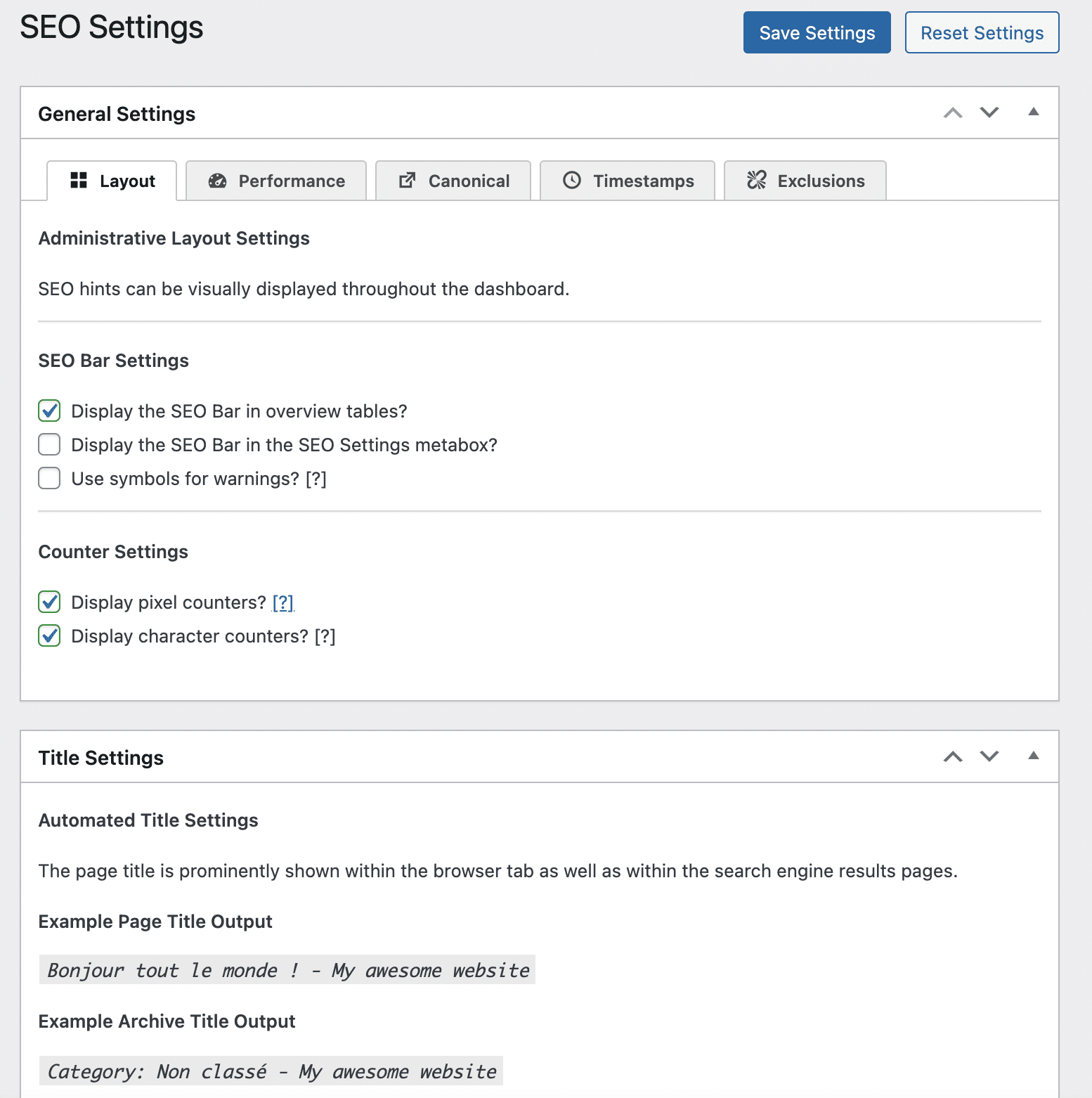
- The presence of essential settings: metadata settings, OpenGraph, Schema marking, automated sitemap generation, meta tags settings for social networks, adding the site to the Google Search Console.
- The color system on mouseover on the listing of your pages or articles to check that basic settings have been made.
- The fact that the plugin is preconfigured from the start to optimize your pages automatically. You can of course modify it to your liking afterwards.
- The absence of advertising and branding.
The plugin is also 100% free. You can even add more options to it with 10 addons contained in the free Extension Manager plugin.
Some of them are free, others are paid. For example, the Focus add-on guides you through the process of writing targeted content, with keywords, their inflections and synonyms.
The SEO Framework, for whom?
The SEO Framework is a very interesting plugin, and not only because it takes a non-commercial approach and focuses on the needs of its users.
Complete, it allows you to perform a basic optimization on your on-page SEO without any problem. If its settings are condensed, there are still quite a few scattered in the tabs, with often technical terms (without precise explanations).
This can be a bit confusing for the beginner profile. In this, The SEO Framework seems to me first and foremost tailored for profiles a little more experienced.
To find out all you need to know about The SEO Framework, read our dedicated article. We show you how to set up this plugin, as well as our opinion on it.
Download The SEO Framework:
Squirrly, the bet of artificial intelligence

Active installations: 100K+
Squirrly SEO is a very unique plugin, as it relies on artificial intelligence to help you optimize your site on search engines.
It is an all-in-one suite that brings together several tools in one place. With Squirrly, you can research keywords, optimize your content, perform audits, track your positions, etc.
Squirrly also claims to offer “the same level of advice as a Human consultant would, yet with greater precision and customization”.
I must admit that this left me a bit dubious but, after all, why not (Rank Math has also started this, but on a smaller scale than Squirrly, for the moment). Let’s see if all this is successful and functional, in use.
With Squirrly, we appreciate
- The innovative approach: an artificial intelligence tool will instantly add more than 400 features for SEO when you install the free version. A configuration wizard will for example activate in a few seconds the SEO meta, the Open Graph, your XML sitemap, a robots.txt file etc.
- Recommendations to improve your SEO, with a precise detail of the tasks to perform.
- The 14-day program that tells you what you need to do for two weeks to improve your ranking.
- The live assistant that helps you optimize the content of your articles and pages.
- Keyword research from your WordPress dashboard, including search volume and competition.
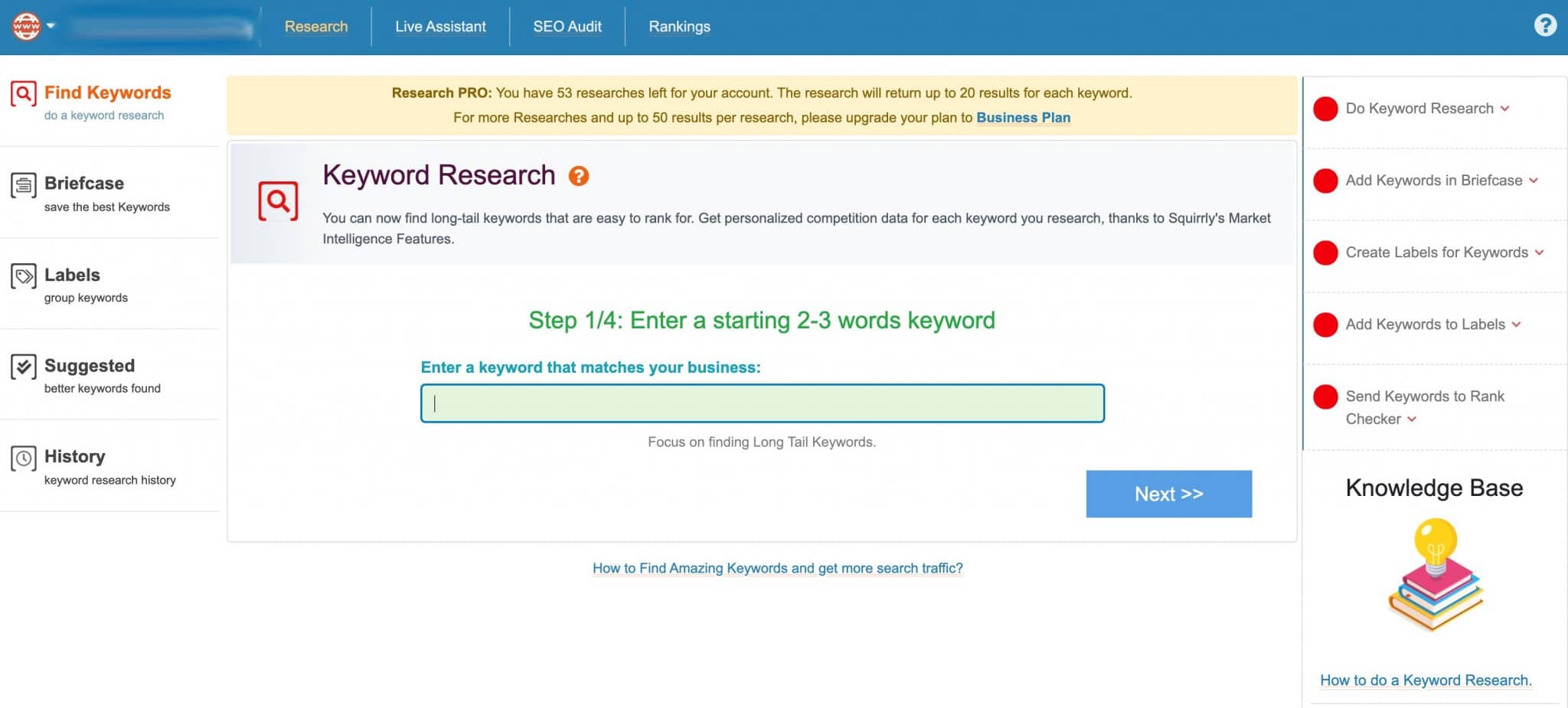
The “Bulk SEO” menu, which allows you to optimize all your publications (meta tags, Twitter Cards, visibility, Open Graph).
Track your average positions, clicks and impressions for all your website’s organic keywords, directly on your dashboard.
Squirrly offers a premium version, starting at $71.99/month, usable on up to 7 sites. It removes many of the limitations of the free version (use on a maximum of one site, limited keyword searches, one audit per week maximum) and offers new features.
Who is Squirrly for?
Squirrly says it’s for “non-SEO experts”, but I wouldn’t recommend it to beginners (and to other profiles too) compared to the other plugins of this test.
Its interface is a real Rube Goldberg machine, with settings everywhere. As a result, you get lost very quickly and you don’t know which way to go. Moreover, the user interface is not the most successful, which does not help to get into it.
It’s a shame because its promises are interesting.
Download Squirrly:
These plugins could also be useful
As I said, this post is intended to present you in detail mainstream WordPress SEO plugins.
However, it’s good to know that there are plenty of very targeted SEO plugins that will allow you to act on specific aspects of your site.
You can for example use them to compensate for a lack or absence of functionality in the mainstream plugin you choose.
Among these targeted plugins, I could mention:
- Broken Link Checker scans and detects broken links on your entire site and allows you to correct them. But beware: it uses a lot of server resources, so use it from time to time to do a check and turn it off when you’re done with your task.
- All in One Schema Rich Snippets allows you to add Schema.org structured data types (reviews, recipes, videos, articles, etc.) to display rich snippets.
- WP Sitemap Page builds your HTML sitemap and creates a “sitemap” page listing all your content. And also XML Sitemaps, to design an XML sitemap. But be careful, these two types of sitemaps can very often be designed with the plugins presented in this guide. Don’t duplicate!
- Redirection helps you to set up 301 redirects (redirection of a user from a URL A to a URL B). To be done as soon as you modify or delete a content.
- Really Simple SSL is used to install HTTPS automatically on your WordPress site, without using the manual method.
- YARPP displays related (similar) posts at the end of your blog posts, to reinforce the internal links between your content.
- WP Rocket is a caching plugin that speeds up the loading of your pages, a very important criterion for the user experience (Google takes this into account in its algorithm). WP Rocket has very simple options to boost your site’s performance (delayed image loading, HTML code minification, CSS and JavaScript file minification and concatenation, database optimization, etc.).
As plugins and theme go hand in hand, I can only advise you to choose a clean theme, coded according to WordPress standards, ergonomic and light. If it applies good SEO practices, you will start with a clean base, which is very important to satisfy search engines. To help you in your search for a good free theme, take a look at our selection.

Which WordPress SEO plugin to choose?
Now it’s time to take stock. Throughout this comparison, you’ve discovered 7 must-have plugins to manage and optimize your site’s on-page SEO.
So, what is the best SEO plugin for WordPress? The answer to this question depends on your needs and aspirations.
To find out, don’t hesitate to check that the features offered by the plugin you are interested in match your expectations. And don’t hesitate to test it! All the plugins presented here have at least a free version.
This is a good opportunity to see if the lucky one can suit you, when you use it. In any case, use only one plugin at a time, this is very important.
This will limit the risks of incompatibility and conflicts, which can lead to bugs and a crash of your site (you might as well avoid that).
Finally, we’re going to take a little risk. WPMarmite has its little favorite: Yoast SEO. Intuitive, clear and with essential features, its “general public” aspect makes it a plugin of choice for the beginner.
After that, the appetence for a SEO plugin also depends on your habits. If you’ve taken your first steps with All in One SEO, you may swear by it. The same goes for Rank Math or SEOPress.
Anyway, all these plugins are good (even if we didn’t really like Squirrly). It remains to be seen which one is right for you.
By the way, do you use one of them on your site? Answer this question by posting a comment, with your feedback.

Receive the next posts for free and access exclusive resources. More than 20,000 people have done it, why not you?







Continue reading
Articles posted in WordPress PluginsSpectra: Dive into this page builder that’s integrated into the WordPress editor
Leaving the native WordPress interface? Never. Drowning you in a slew of widgets? He wouldn’t dream of it. With this guy, blocks are the guiding light. Create your next WordPress site without leaving the default editor (Gutenberg), without coding, and…
WP Rocket: We went over this plugin with a fine-tooth comb [2024 Review]
It took me a while, but I finally found it. Yes, I found someone who dared to criticize the WP Rocket plugin sharply. What a nerve! This reader of an American site specializing in WordPress, says that this plugin has…
Yoast SEO: a guide to set up the best SEO plugin for WordPress
With more than 620 million downloads at the time of writing, Yoast SEO is one of the 10 most downloaded plugins of all time. Officially, it’s installed on websites in order to optimize their SEO (Search Engine Optimization). Put another…